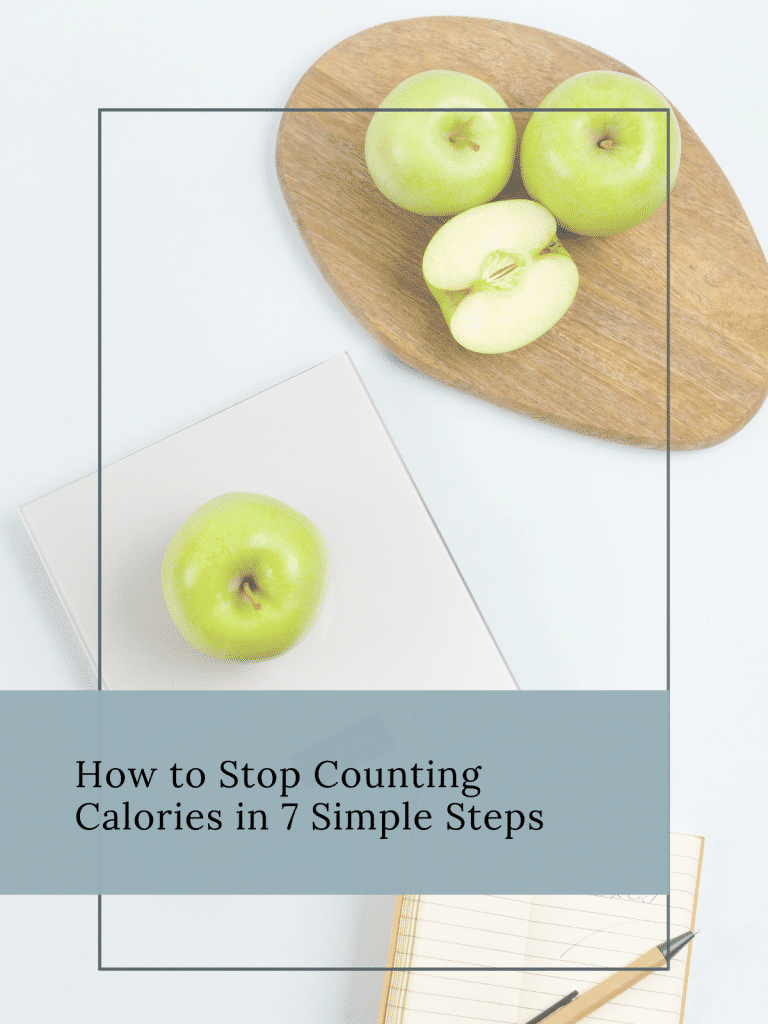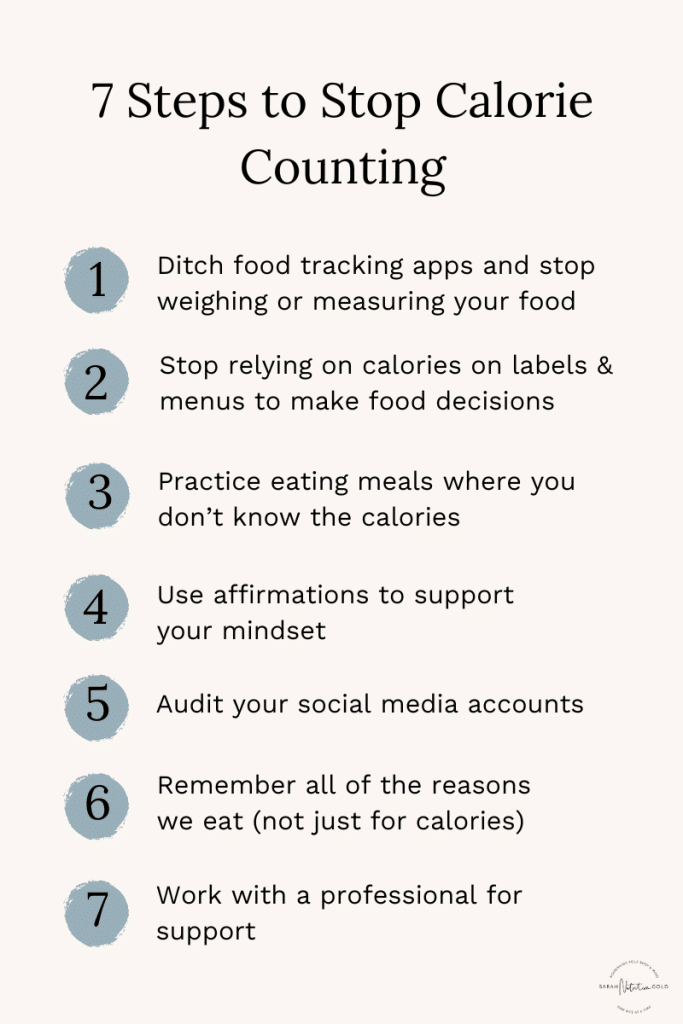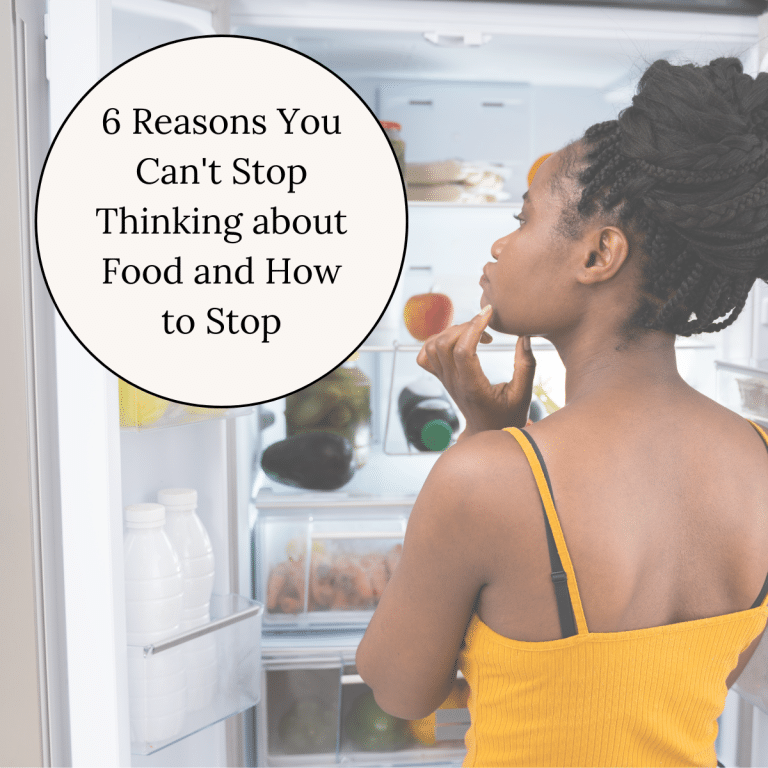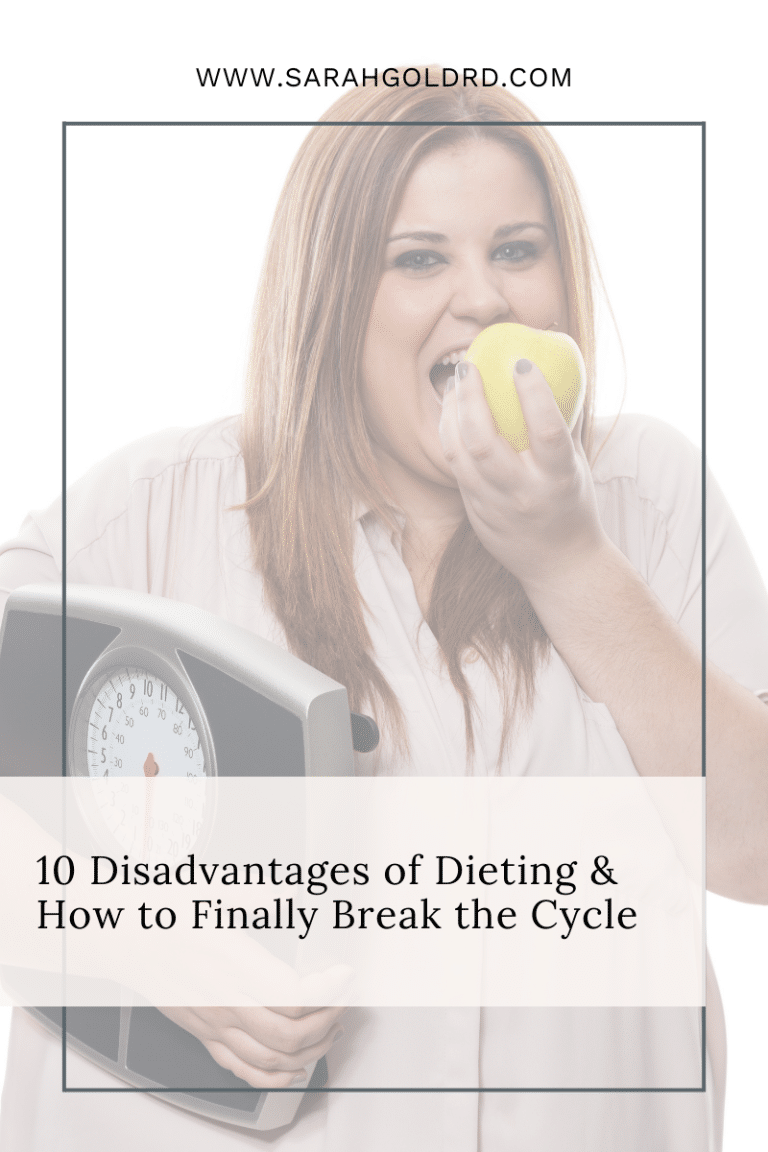How to Stop Counting Calories in 7 Simple Steps
You probably started counting calories with the best of intentions. But what started as a simple tool to track what you eat (and lose weight) can quickly spiral into an obsessive habit that takes joy out of eating and consumes your life.
Letting go of this meticulous tracking can be daunting, especially after years of relying on it. Calorie counts may even live in your head rent-free, making the transition to a life free from calorie counting quite challenging.
It’s important to recognize that the need to count calories often stems from the diet culture belief that equates thinness with health and happiness, which is far from the truth. And everywhere you turn it may feel like someone is just telling you to eat less.
Reflecting on the reasons behind stopping calorie counting is an integral step in your journey toward a healthier relationship with food. Abandoning the calorie counting practice doesn’t mean giving up on health—it means taking a step towards trusting your body.
What’s more, moving away from calorie counting doesn’t leave you without guidance. Shifting to an intuitive eating approach, which focuses on tuning into your body’s cues paired with gentle nutrition, empowers you to make sound food decisions without obsessing over labels.
In this article you’ll learn more about why you should stop counting calories, 7 practical steps to move away from counting calories, and what to do instead.

Why You Should Stop Counting Calories
Calorie counting can feel innocent at first. It can start with checking the labels of a candy bar you’ve just eaten. Or deciding to choose a lower-calorie option at a restaurant.
But it can soon lead to fixating on numbers and may be a warning sign of disordered eating and eating disorders. And it can negatively impact your quality of life and health.
Calorie counting impacts your mental health
Calorie counting can lead to an unhealthy fixation on food, which often exacerbates stress and negative emotions. The constant monitoring may result in increased anxiety around food and negatively affects your mental wellbeing.
It’s time-consuming
Keeping track of every calorie you consume is a labor-intensive process. It eats away at your time, making mealtime a chore rather than a pleasure. And joy is an important part to eating and being able to stop when you’re satisfied.
It also contributes to food obsession, which takes up your precious brain space. Imagine what you could achieve with all that time and energy instead of constantly adding up every bite of food.
Counting calories can lead to under eating (and a slowed metabolism)
Calorie counting apps often recommend significantly cutting calories. Too large of a caloric deficit can prompt your body to slow its metabolism, a natural survival mechanism.
This means you might end up consuming too little to support your body’s functions, which can be counterproductive to your health (and weight loss goals in the long-term).
Long-term calorie restriction has been associated with reduced muscle strength, slower metabolism and an impaired immune system. You’re also very likely to gain the weight back (and then some) as a result of metabolic adaptations from significantly cutting calories.
If you want to learn more about this, our article on the disadvantages of dieting further explains why diets don’t work (including calorie counting) and are damaging to your physical and mental wellbeing.
Calorie-counting apps don’t know how much your body needs to eat
Apps and online calculators provide generic estimates, but they lack the personalized touch necessary to determine what your unique body needs. Your body is not a simple math equation.
The amount of calories you need to eat depends on your age, gender, muscle mass, genetics, activity level, how much you sleep, your stress levels, medications you take, medical conditions, and hormones (especially for females). My Fitness Pal knows none of this about you.
Calories on packaging may be off by up to 20 percent.
Calories listed on food packaging aren’t always accurate and can legally vary by up to 20 percent, according to FDA guidelines. This discrepancy means relying solely on these numbers can be misleading and highlights how it can be a waste of time and energy to count calories!
You don’t need the same number of calories every day
Your body’s energy needs fluctuate daily based on various factors like activity level, hormonal changes, how much you’ve slept, what you ate in the last few days, and more. That’s why some days you may feel OK hitting a certain calorie goal and totally ravenous others.
Calorie counting can put you into a restrict-binge cycle
Rigid calorie tracking can often lead to cycles of restriction followed by inevitable bingeing. This pattern is unproductive and can damage your relationship with food, trapping you in an endless cycle.
Learn more about the binge-restrict cycle and how to break free from it.
Why You Don’t Need to Count Calories
You were born with an internal calorie counter—a complex system involving hunger cues and satiety signals which, when listened to, can guide you towards your body’s energy needs without the need to obsessively track every calorie.
Pair this with gentle nutrition, and you’ll have everything you need to eat the right amount and a variety of foods that support your health and wellness.
It can be so freeing and empowering to trust in your body’s natural ability to signal hunger and fullness. By tuning in to these cues, rather than relying solely on numerical values, you can eat in a way that is in alignment with your body’s needs.
Remember, the pressure to count calories does not originate from your body’s needs but from external influences of the diet industry. You can learn to trust your body to tell you when and how much to eat (instead of counting calories).
7 Steps to Stop Counting Calories
Transitioning away from counting calories is a gradual process for most people. These steps will help you let go of the need to obsess over calories counts and ultimately build a healthier relationship with food and eating.

Ditch the Apps and Food Scale
Remove all calorie tracking applications such as MyFitnessPal from your devices and put away your food scales. Instead of measuring every gram or ounce, begin to trust your ability to judge portions based on what fills you up and satisfies you.
A 2017 study found that 73 percent of MyFitnessPal users perceived the app as contributing to their eating disorder, highlighting the negative impact these types of apps and tools can have on your physical and mental wellbeing.
Stop Relying on Calories on Labels and Menus
Work towards ignoring calorie counts displayed on food labels and restaurant menus. This step helps shift your focus from numbers to the quality and enjoyment of the food you’re eating. But, it may not feel easy.
You may want to begin by not checking the labels on sauces or condiments. Or covering up the labels of your breakfast foods with stickers or colored tape. These small steps can start to break the habit of obsessively checking calories.
This doesn’t mean that you have to forever ignore all calorie information. In fact, sometimes calorie information can be a helpful tool without being the only reason you choose a food.
For example, understanding your needs and what fills you up may help you realize that choosing a 100-calorie snack is not enough! Or knowing that the super low-calorie breakfast item may leave you feeling ravenous in an hour.
But moving away from choosing foods based on calories is an important step to stop the constant thoughts around calorie counts.
Practice eating meals where you don’t know the calories
Challenge yourself by eating meals without knowing their caloric values. This can help you to listen to your body’s fullness signals rather than adhering to calorie limits.
Eating out at restaurants that don’t post calories (and resisting from trying to calculate it yourself) is a one way to practice listening to your body instead of relying on calories.
You may also ask a friend or family member to support you by making you a meal without any caloric information. Doing this with someone you trust can also help to make this seem less scary and overwhelming.
Use affirmations
Incorporate positive affirmations into your daily routine to reinforce your commitment to move away from calorie counting. If you find yourself mentally adding up calories from the meal or day, pause and remind yourself why you don’t want to count calories anymore.
Try using affirmations such as:
- I trust my body’s hunger signals
- Calories are energy that helps fuel my body
- Calorie counting is keeping me stuck in a place I don’t want to be. I am learning to trust my body about how much I need to eat
- My food choices and my weight do not define who I am
- I can let go of old habits that don’t serve me any longer
Plus, working on your body image by using positive affirmations can be helpful. Our article 40 body image affirmations and is a great place to start.
Audit your social media accounts
Examine the social media accounts you follow. Unfollow or mute those that focus heavily on calories, dieting, and body negativity, and choose to engage with content that promotes a positive and an intuitive eating approach to food.
Remember that there are a lot of reasons why we eat, not just for energy
Acknowledge the various reasons for eating—pleasure, social connection, or emotional comfort. Eating is not solely about meeting energy requirements but can be an opportunity to celebrate and bring joy to your life.
Work with a professional
Consider seeking support from a registered dietitian specializing in intuitive eating. They can provide guidance tailored to your needs on how to nourish your body with a variety of foods while moving away from calorie counting.
If you are looking for support, we offer both individual and group nutrition coaching founded in an intuitive eating approach to help you stop calorie counting for good.
What to do instead of calorie counting
If you’ve relied on calorie counting for a long time, you may be wondering—how do I know how much to eat if I’m not counting calories?
Learning to reconnect with your body and listening to hunger, fullness and satisfaction can be a great way to begin trusting yourself and bring you back to the calorie counter you were born with.
Connecting with and interpreting your body’s signals is a foundational aspect of intuitive eating. On the journey of reconnecting with these cues, the hunger-fullness scale can help you to better grasp how your body communicates its needs.
Once you’ve let go of the dieting mentality then you can begin to adopt the principles of gentle nutrition. Gentle nutrition helps you eat foods that support your health without giving up your favorite foods.
Final Thoughts: How to Stop Counting Calories
Calorie counting may be a tool you’re relying on to feel in control around food. But, as discussed in this article, there can be many negative implications of calorie counting.
Moving away from counting every single calorie in your head, and obsessing over food labels takes time. Giving yourself compassion and grace is key.
However, it can be very challenging to do on your own. Getting the support you need can not only expedite the process, but also give you confidence when it feels hard.
Inside our signature program The UNDIET Method, we give you the exact step-by-step process you need to take to stop relying on calorie counting (and free your mind of the counts living rent-free) while building trust in your own body to guide you with what, when, and how much to eat, while building habits that last.
No diets, counting, or giving up your favorite food.







7 Comments